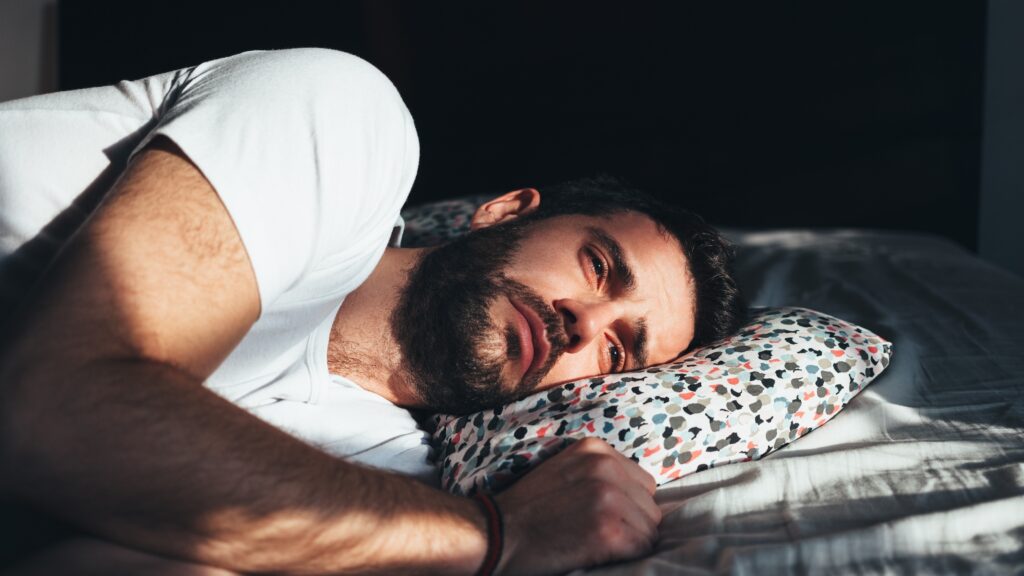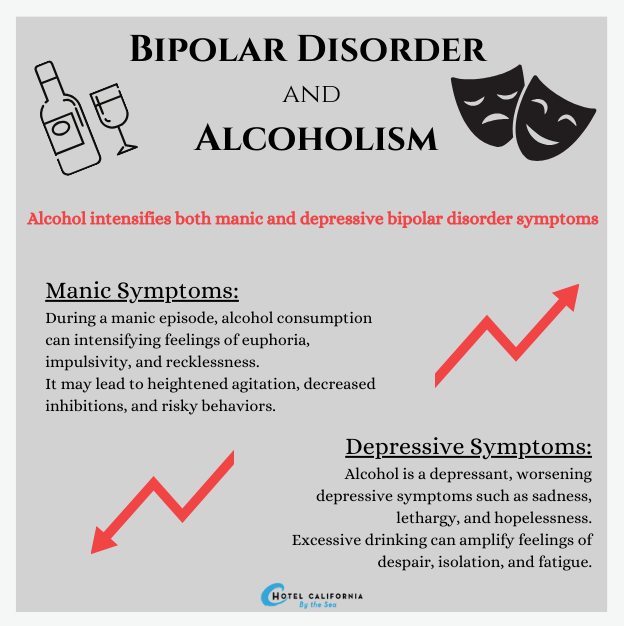The link between Bipolar Depression and Alcohol
Bipolar disorder and alcohol use disorder often occur together and can significantly influence each other’s severity and projection of the disease. In fact, both mental illnesses occur at higher than expected rates and also happen much more often than reported. Alcohol use disorder is a pattern of alcohol use that is characterized by the inability to control drinking behaviors that cause significant impairment to the brain and body.

Alcohol dependence is twice as likely to occur in those who suffer from bipolar spectrum disorders. About 14% of people experience alcohol dependence. The comorbidity rate for bipolar disease and alcoholism ranks as one of the highest among the major mental health disorders. An estimated 43% of people with bipolar disorder also have an alcohol use disorder. Both conditions significantly influence each other’s severity and progression of the disease.
A study from the National Institute of Mental Health’s Epidemiologic Catchment Area and National Comorbidity Survey found that an estimated 60% of people with bipolar 1 had a lifetime diagnosis of substance use disorder. About 47% of those people with bipolar 1 disorder had an alcohol use disorder. These studies show how closely linked bipolar disorder and alcohol abuse is. For a person who experiences both conditions, it matters which condition appeared first and was first diagnosed. This can better help treat the co-occurring mental health conditions.
What is Bipolar Disorder?
Bipolar disorder is a mood disorder that is characterized by a distinct pattern of high and low mood episodes. There are periods of mania, hypomania, and depression. Because of the constant unpredictable changes in mood and behaviors, bipolar disorder can significantly affect a person’s level of functioning and quality of life. This disease often goes undiagnosed and untreated for long periods of time, which can end up making it worse for those who suffer.
Bipolar disorder or bipolar depression is often also referred to as manic depression. The extreme fluctuations in mood from euphoria and bliss to severe depression along with periods of a normal stable mood can occur in those who have bipolar disorder. Bipolar depression and alcohol use disorder are very closely linked and significantly affect each other’s outcome. Studies have shown that the majority of those with bipolar depression will also develop an alcohol abuse disorder at some point in their lives.
Some symptoms of bipolar disorder are hopelessness, feeling lost, changes from intense feelings of happiness to numbness, and the constant back-and-forth struggle of those emotions. More intense and severe symptoms include hallucinations, delusions and psychosis. People who suffer from bipolar disorder can feel out of control and even out of touch with their own lives.

Types of Bipolar Disorder
- Bipolar 1 – This type of bipolar disorder is characterized by an intense state of illness. A mixed state of mind will occur with feelings of euphoria or excitement. This stage of happiness will drastically change and is followed by feelings of extreme sadness and depression. It is also often referred to as mania. This condition can become so severe that it may require hospitalization in order to help stabilize the patient.
- Bipolar 2 – This type of bipolar disorder is less intense can cause elevated moods of joy without ever reaching the high intensity of mania. Often referred to as hypomania in a person may experience intense emotions but generally does not lose touch with reality. Bipolar depression is often associated with this stage of the disease and can frequently be misdiagnosed as general depression. Bipolar 2 disorder is diagnosed as having at least one major depressive episode that lasts two weeks or more, along with one or more hypomania episodes that last for up to four days.
- NOS – This stands for not otherwise specified. This type of bipolar disorder is characterized by sporadic patterns of feelings and behaviors that include euphoria and depression.
- Cyclothymic – This type of bipolar disorder is a mild form while still experiencing frequent up and down feelings. However, there is a more stable balance of feelings between the minor disruptive emotions.
- Rapid Cycling – This type of bipolar disorder is characterized by the feelings of complete loss of control. This person may experience four or more occasions of mania, hypomania and depressive episodes over the course of a year. There may be instances of spiraling episodes followed by stabilized feelings until the cycle begins again.
Check Your Insurance Coverage for FREE
Find out if your insurance covers addiction treatment in minutes. We accept most insurance!
Bipolar Depression and Alcohol
Bipolar disorder causes intense feelings of both happiness and depression. Bipolar depression and alcohol are very closely connected. Oftentimes depression associated with bipolar disorder can lead to intense feelings. When individuals are unable to process, manage and deal with these intense episodes of depression, they often turn to alcohol as a form of self-medication. Alcohol is used to help suppress the intensity of depressive feelings, and manage their symptoms, especially when it comes to maniac episodes. However, turning to alcohol can make the condition worse and most times exacerbates and worsens those feelings of depression and anxiety.
Because the two mental health illnesses are so closely linked, they often exhibit similar traits. Those who have bipolar disorder can exhibit reckless behaviors and decision-making skills, which is also a characteristic of those who have an alcohol use disorder. During bipolar depressive episodes, a person can experience low mood, which is intensified by alcohol because it is a depressant. Consuming alcohol while experiencing this low mood can intensify the feelings of depression and increase the risk of suicidal behaviors.
Factors that Contribute to Co-Occurring Disorders
- Genetics – Having a parent, sibling or close family member with bipolar disorder raises the risk of developing the disease. The National Institute on Alcohol Abuse and Alcoholism estimates that the heritability of bipolar disorder is about 60% in families. Some research has found that specific genes can increase the risk of developing bipolar disorder. These genes can affect brain chemistry and are also linked to the ability to influence alcohol addiction.
- Mood disorders such as Depression and Anxiety – Most often, those who have bipolar depression and bipolar mood disorders drink alcohol to self-medicate. They drink to help ease the depression and can temporarily help with the symptoms. People with bipolar disorder are unable to cope with the emotional discomfort and so they turn to alcohol to relieve that pain and stress. Alcohol will often make depression and anxiety worse in the long term.
- Mania – Mania is described as a mood in which a person can feel unusually happy with high energy and hyperactivity. It can reduce inhibitions, lead to poor judgment, and overindulgence in pleasurable activities such as alcohol misuse and engaging in risky behaviors. When alcohol is added, it can increase the effects of impulsivity and worsen symptoms of depression and anxiety.
How Bipolar Disorder and Alcohol Affect Each Other
- Alcohol is used to temporarily help a person with bipolar disorder calm their nerves and help clear their mind
- Alcohol can intensify bipolar side effects and symptoms
- Alcohol greatly increases the severity of mania and can increase the negative effects of bipolar disorder in either direction of the mood spectrum.
- Alcohol can destabilize bipolar disorder in which the person begins losing control of his or her own emotions.
Reach out to Hotel California by the Sea
We specialize in treating addiction and other co-occurring disorders, such as PTSD. Our Admissions specialists are available to walk you through the best options for treating your addiction.
Treatment for Alcohol Use Disorder and Co-Occurring mental health conditions
Both bipolar depression and alcohol abuse make each other worse. The combination of the two conditions can even create longer-lasting symptoms that can worsen each other’s condition. It is one of the most common co-occurring mental health conditions. Hotel California by the Sea provides a full continuum of support and treatments to help people with bipolar depression and alcohol use disorder.
We provide all levels of care including detox, residential inpatient, PHP, and IOP programs. In addition, we use evidence-based treatment methods that include CBT, DBT and family therapy to help clients better understand the intricacies of the disease. Hotel California by the Sea will provide the tools and resources clients need to recovery and life a happier and healthier life in sobriety.
References:
https://www.ncbi.nlm.nih.gov/pmc/articles/PMC6683827
https://www.alcoholrehabguide.org/resources/dual-diagnosis/alcohol-and-bipolar-disorder
https://www.ncbi.nlm.nih.gov/pmc/articles/PMC8021702
https://www.healthline.com/health/bipolar-disorder/bipolar-and-alcohol
https://www.verywellhealth.com/bipolar-disorder-and-alcohol-5208833
